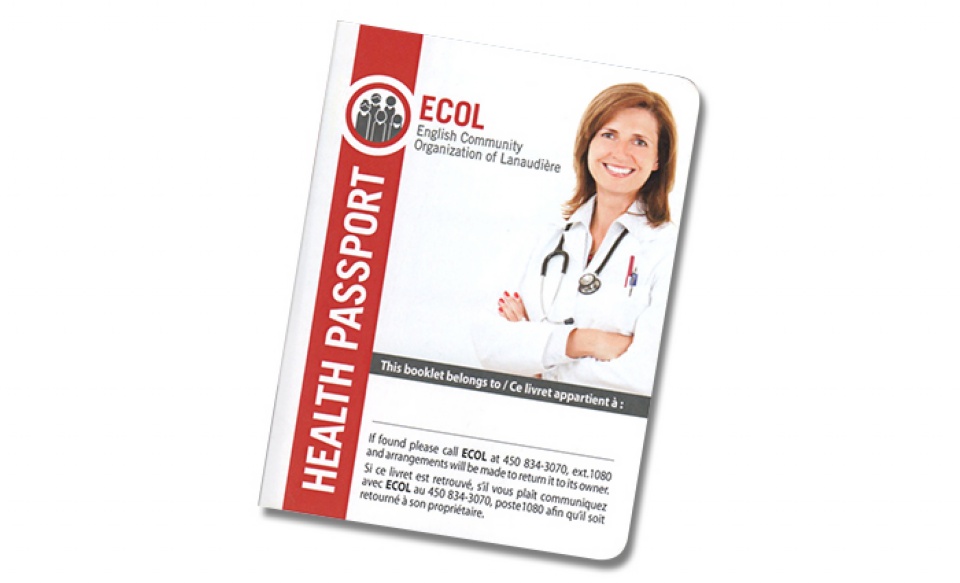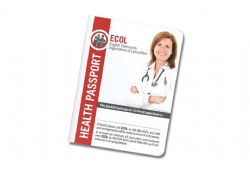Good
communication is very important in healthcare. Patients must be able to
describe their symptoms and answer the healthcare professional’s questions with
clarity and without ambiguity. They must also be able to understand the
instructions received for follow-up, use of medication, referrals, etc. Many
people find that when they are stressed or ill, they tend to revert to their
native tongue. While being able to use one’s language is reassuring and ensures
proper communication, the reality for many Anglophones in Quebec is that health
and social services in English are not always available when they need them.
The
Health Passport is a document that facilitates communication between
English-speaking patients and French-speaking health professionals. It was
inspired by a document initially created by the Mégantic Community Development
Corporation (MCDC) in Thetford Mines and has been adapted for the Lanaudière region
by the English Community Organization of Lanaudière (ECOL). On the cover
appears a message in French that can be shown to the reception personnel to
relate that its bearer is in need of assistance and does not speak French.
The
Health Passport contains the medical history of the bearer which should be
completed in French by a health care professional, current medication being
taken, a list of things to do in order to be prepared for a visit to the
doctor, and a lexicon organized in sequential order to explain symptoms. There
is a description of different pains and symptoms. The passport is
chronologically arranged to reflect the question sequence from a health care
professional in order to avoid waste of time and to decrease stress-induced
communication problems.
The
bearer can speak in English as he/she reads the English portion on the left
side of the page and points towards the French translation on the right side
for the healthcare worker to read in French. The reading process can also be
easily reversed and used by a French-speaking person to obtain information from
the Anglophone.
This
booklet is useful during routine exams, clinical visits and emergency
situations, such as communicating with a Francophone ambulance attendant or
triage nurse. It is also useful if the bearer is unconscious because it also
contains who to reach in case of an emergency and the complete medical history
of the bearer including allergies and recent blood pressure readings. There is
also a space to inscribe contact numbers in case of an emergency situation.
To
obtain free copies of the Health Passport for yourself and your family members,
contact The English Community Organization of Lanaudière (ECOL) by leaving a
message with your name and telephone number at (450) 834-3070 extension 1080 or
(450) 882-2123 extension 3045; or by email at ecollanaudiere@hotmail.com.
If
you prefer new technologies over old-school paper copies, the Community Health
and Social Service Network (CHSSN) has also developed an electronic version of
the Health Passport. You can download the application at http;//health-passport.ca/.
Source;
Michelle Eaton-Lusignan, Executive Director
English
Community Organization of Lanaudière
450-421-5379
/ ecollanaudiere@hotmail.com

 In The Latest Issue:Latest Issue:
In The Latest Issue:Latest Issue:
- A Bittersweet Farewell
- The new Laval Aquatic Co...
- The End of an Era:
Articles
Calendar
Virtual- ANNUAL TEACHER APPRECIATION CONTEST
- APPUI LAVAL
- ARTS & CULTURE
- CAMPS
- CAR GUIDE
- CCIL
- CENTENNIAL ACADEMY
- CHARITY FUNDRAISING
- CITYTV
- COSMODÔME
- COMMUNITY CONNECTIONS
- COVER STORY
- DINA DIMITRATOS
- ÉCOLE SUPÉRIEURE DE BALLET DU QUÉBEC
- EDITORIALS
- ÉDUCALOI
- EDUCATION
- EMPLOYMENT & ENTREPRENEURSHIP
- FÊTE DE LA FAMILLE
- FÊTE DU QUARTIER SAINT-BRUNO
- FAMILIES
- FESTIVAL LAVAL LAUGHS
- FÊTE DE QUARTIER VAL-DES-BRISES
- FINANCES
- GLI CUMBARE
- GROUPE RENO-EXPERT
- HEALTH & WELL-BEING
- 30 MINUTE HIT
- ANXIETY
- CHILDREN`S HEALTH & WELLNESS
- CLOSE AID
- DENTAL WELLNESS
- EXTREME EVOLUTION SPORTS CENTRE
- FONDATION CITÉ DE LA SANTÉ
- GENERAL
- HEARING HEALTH
- MESSAGES FROM THE HEALTH AGENCY OF CANADA
- MENTAL HEALTH
- SEXUALITY
- SOCIAL INTEGRATION
- SPECIAL NEEDS
- TEENS
- THE NUTRITION CORNER
- THE NUTRITION CORNER - RECIPES
- VACATION DESTINATION
- WOMEN'S FITNESS
- WOMEN'S HEALTH
- HILTON MONTREAL/LAVAL
- HOME & GARDEN
- INTERNATIONAL WOMEN'S DAY
- JAGUAR LAVAL
- LAVAL À VÉLO
- LAVAL FAMILIES TV SHOW
- LAVAL FAMILIES MAGAZINE CARES
- LAVAL URBAN IN NATURE
- LE PARCOURS DES HÉROS
- LES PETITS GOURMETS DANS MA COUR
- LEON'S FURNITURE
- LEONARDO DA VINCI CENTRE
- LFM PREMIERES
- LIFE BALANCE
- M.P. PROFILE
- MISS EDGAR'S AND MISS CRAMP'S SCHOOL
- MISSING CHILDREN'S NETWORK
- NETFOLIE
- NORTH STAR ACADEMY LAVAL
- OUTFRONT MEDIA
- PASSION SOCCER
- PARC DE LA RIVIÈRE-DES-MILLE-ÎLES
- PÂTISSERIE ST-MARTIN
- PIZZERIA LÌOLÀ
- PLACE BELL
- PORTRAITS OF YOUR MNA'S
- ROCKET DE LAVAL
- SACRED HEART SCHOOL
- SCOTIA BANK
- SHERATON LAVAL HOTEL
- SOCIÉTÉ ALZHEIMER LAVAL
- STATION 55
- STL
- SUBARU DE LAVAL
- TECHNOLOGY
- TEDXLAVAL
- TODAY`S LAURENTIANS AND LANAUDIÈRE
- TODAY`S LAVAL
- WARNER MUSIC
- THIS ISSUE
- MOST RECENT
Magazine
Do You Have Your Health Passport?
Articles ~e 105,7 Rythme FM 4 chemins Annual Teacher Appreciation Contest Appui Laval Arts & Culture Ballet Eddy Toussaint Camps THIS ISSUE MORE...
CONTESTS Enter our contests
CONTESTS Enter our contests
CALENDAR
Events & Activities
COMMUNITY Posts Events
PUBLICATIONS Our Magazine Family Resource Directory
LFM BUSINESS NETWORK Learn more
COUPONS Click to save!
COMMUNITY Posts Events
PUBLICATIONS Our Magazine Family Resource Directory
LFM BUSINESS NETWORK Learn more
COUPONS Click to save!
SUBSCRIPTIONS
Subscribe to the magazine
Un-Subscribe
E-NEWSLETTER Subscribe to our E-newsletter Un-Subscribe
WRITE FOR US Guidelines & Submissions
POLLS Vote today!
E-NEWSLETTER Subscribe to our E-newsletter Un-Subscribe
WRITE FOR US Guidelines & Submissions
POLLS Vote today!
ADVERTISERS
How to & Media guide
Pay your LFM invoice
SUGGESTIONS Reader's Survey Suggest a Listing
LFM About Us Our Mission Giving Back Contact Us
SUGGESTIONS Reader's Survey Suggest a Listing
LFM About Us Our Mission Giving Back Contact Us
 PICK-UP LOCATIONS
Get a copy of LFM!
PICK-UP LOCATIONS
Get a copy of LFM!
TERMS & CONDITIONS Privacy | Terms
ISSN (ONLINE) 2291-1677
ISSN (PRINT) 2291-1677
Website by ZENxDESIGN




 BY:
BY: 
Tweet
Share